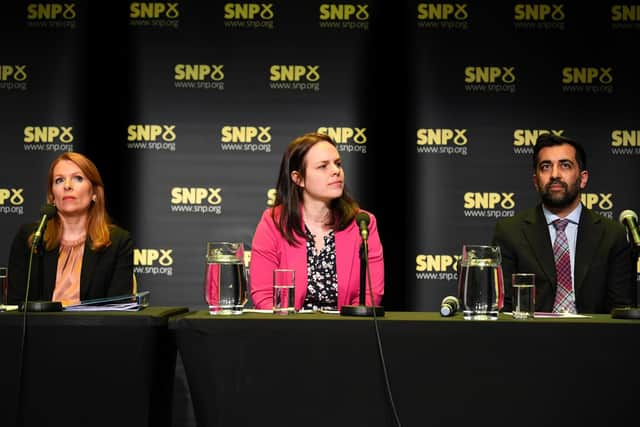SNP leadership contest: How the vote will be run, controversies, and the voting firm behind the ballot
Q When will voting get underway?
With hustings and television debates between the candidates continuing at pace, it is not long until the SNP’s 100,000 plus members will finally get a chance to have their say on who should succeed Nicola Sturgeon. The window which allows the party’s members to begin casting their votes will begin on 13 March, and will remain open until noon on 27 March. The result is expected to be declared later that day.
Q How will the winner be elected?
The election is being carried out using the single transferable vote system, with the majority of party’s members receiving electronic ballot papers by email. Others without email addresses will receive paper ballots by post. They will be asked to rank all three candidates in order of preference. However, they do not need to select all three; they can choose to select one or two candidates if they so wish. If, after the first preference votes are tallied, no candidate has won 50 per cent plus one of the votes, the candidate in third place will fall out of the race, and the second preference votes cast by their supporters will be added to the totals of the other candidates. The SNP has said the number of votes each candidate receives will be published at each stage of the process.
Q Does that system favour certain candidates?
Advertisement
Hide AdAdvertisement
Hide AdIt is impossible to second guess the second preferences of members, but there are clear parallels between some of the candidates which may come into play. For example, both Kate Forbes and Ash Regan have been critical of the Gender Recognition Reform (Scotland) Bill, meaning that the former candidate picks up more second preference votes from the latter’s supporters if, as is expected, Ms Regan comes third.
Q Does the SNP administer the voting process?


No, the responsibility for administering the ballot lies with Mi-Voice, the trading name for a company called Democracy Technology Limited, part of a group called iMeta Technologies, which made its name by providing secure apps for banks and the finance sector. Based in Southampton, it has 17 years of experience in managing elections across both the public and private sectors, working for a diverse range of clients including charities, housing associations, and student unions. In recent months, its work in Scotland has included handling the online ballot of the Scottish Secondary Teachers’ Association after the latest COSLA pay offer. It also managed the Crofting Commission elections.
Q Why is Mi-Voice handling the vote for a political party’s leadership contest?
The firm has extensive experience managing political ballots, having worked for numerous local authorities across the UK, France, and Italy, as well as developing a statutory e-voting platform for the UK government’s electoral modernisation programme. But it also has a longstanding working relationship with the SNP dating back to around 2015. It has handled scores of previous key party votes, such as the deputy leadership contest in 2018, as well as various regional contests for party constituency candidates. In 2015, for example, the firm ran nearly 50 elections as part of the party’s candidate selection process.
Q What security measures are being put in place around the voting?
The electoral system built by Mi-Voice uses secure data encryption, with a UK-hosted data centre, and its databases only store details of how a vote was cast, not who cast it. Those members casting their votes electronically will be issued with individual security codes, which can only be used once.
Q Will the Electoral Commission have any oversight over the contest?
The independent body which oversees elections and regulates political finance has no official role in internal party elections, including leadership elections. The rules and processes for voting internal party elections are a matter for the party. It does regulate donations that are received, but the SNP has set a cap on these of £50.
Q Are there concerns about the integrity of the voting process?
Kirk Torrance, a former Alba candidate and SNP new media strategist who is advising Ms Regan’s campaign, has called for an independent adjudicator to be instructed to monitor the SNP’s digital election systems and processes, but the vote for the new party leader is being organised by Mi-Voice. Certain actors in the extreme fringes of the nationalist movement who are critical of the SNP have made unsubstantiated allegations about the potential for the contest to be abused, including claims that the party’s HQ could instruct Mi-Voice to add votes for candidates after the ballots close. Such allegations predate the current leadership contest, and in the midst of an increasingly febrile contest for the future of the SNP, they continue to be amplified online.
Q Have there been any other concerns about the contest?
The SNP MSP Emma Harper has been sanctioned for using the SNP’s internal email system to contact members as part of her campaign in support of Mr Yousaf’s candidacy, which flouted party rules. She had since apologised to the other candidates, but the incident has been seized upon by some in the fringes of the nationalist movement, who have made unsubstantiated allegations that senior figures in the party allowed Ms Harper access.
Q What about concerns over the contest’s rules?
Some commentators have argued that the 17 days of campaigning between the field’s declaration and the opening of the voting window favours higher profile candidates, and puts Ms Regan at a disadvantage. The duration of the campaign is markedly shorter than the last time the SNP had a leadership contest; back in 2004, nominations closed on 15 July, with voting getting underway on 13 August, allowing candidates 29 days of campaigning.
Comments
Want to join the conversation? Please or to comment on this article.